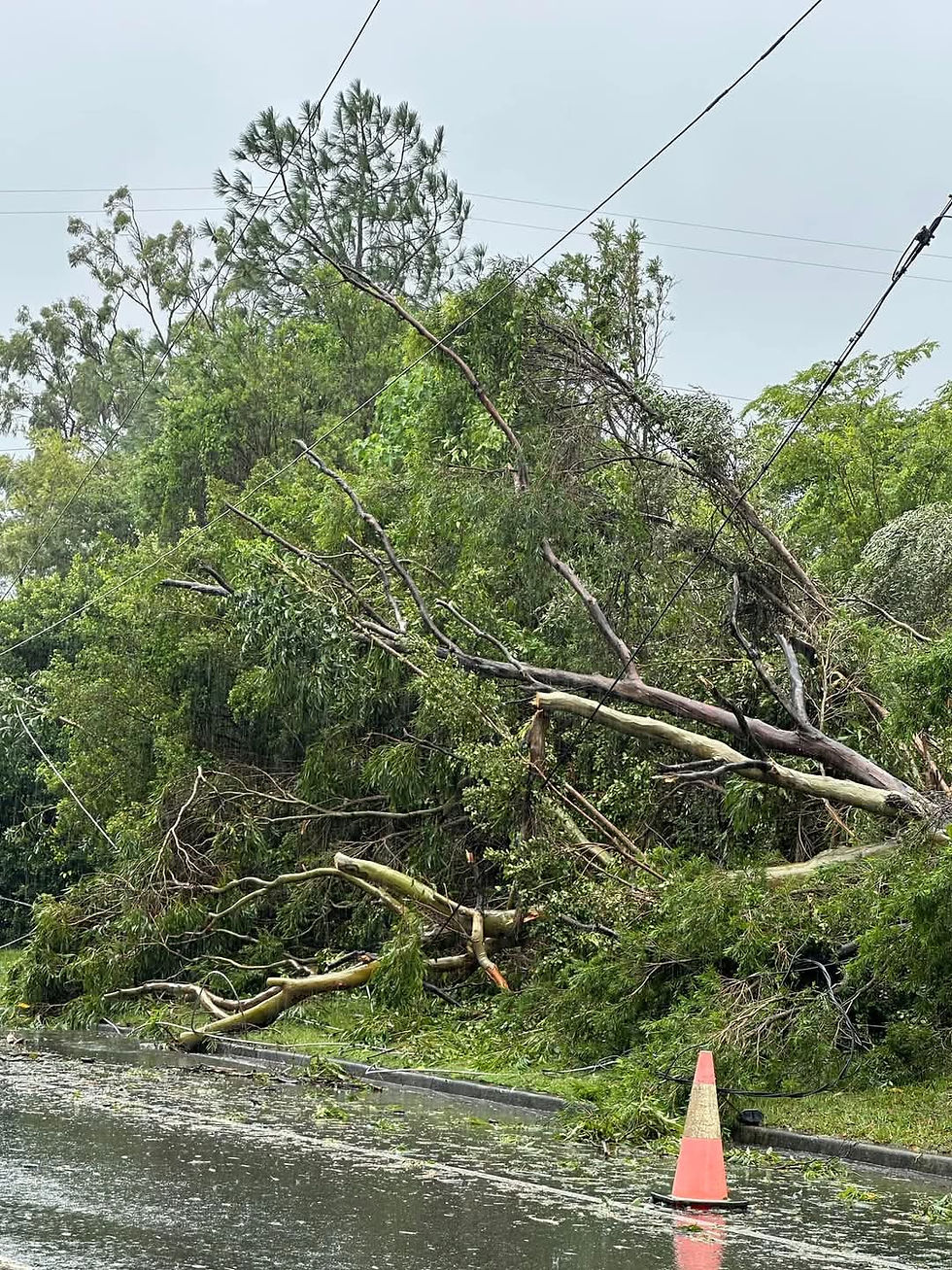How to Maintain Mental Wellbeing in the Wake of Cyclone Alfred: A Guide to Post-Disaster Stress Management
- Matthew Vincent

- Mar 11, 2025
- 4 min read
Updated: Jul 27, 2025
As Cyclone Alfred moves on, many families face increased stress and anxiety while trying to navigate this disruption to their lives. It's completely normal to feel lost, angry and overwhelmed. The anticipation waiting for it to cross created heightened anxiety for everyone. Will it be a category 1,2 or 3? The uncertainty changed our routines.
This guide offers practical strategies to maintain your mental wellbeing as you navigate the recovery process.

Understanding the Effects of Disasters on Mental Health
Experiencing a cyclone can trigger various emotional reactions, including anxiety and symptoms of depression. In fact, studies show that approximately 30% of people exposed to natural disasters develop symptoms of post-traumatic stress disorder (PTSD). Recognising these feelings is the first step toward recovery.
Accepting your emotions instead of suppressing them aids in healing. A mix of anger, sadness, relief, and confusion is entirely natural while processing the aftermath of such a disaster. Understanding these feelings can help lead to more effective coping mechanisms.
Acknowledge Your Feelings
After the storm has passed, many find themselves wrestling with trauma. Recognising your feelings is essential for healing. Allow yourself to experience whatever emotions come up without judgment.
Ignoring or dismissing these feelings can worsen stress and lead to long-term issues. Consider free writing, journaling, or talking with a trusted friend or family member to navigate these complex emotions.
Reestablish your Routine
Amid uncertainty, creating a daily routine can provide a sense of stability. Establishing a schedule for essential tasks like work, meals, and self-care can help ground you. A routine self-care strategy for me was taking the time to sit with our cats, they offer so much love and affection.
Other ideas include small acts of mindfulness (being present), such as deep-breathing exercises or five minutes of gentle stretching, to ease stress. Reports suggest that establishing a daily routine can help reduce anxiety levels by up to 30% in the days following a crisis.
Stay Connected
Feelings of anxiety often grow in isolation. It is important to actively maintain connections with family, friends, and community members. This was quite difficult after the cyclone, as many families' member were without power, internet and phone connection. So, when safe we drove out to see them. What we all need is a calm presence and offering that to each other is vital to coping.
Reach out for support, whether through phone calls, video chats, or safe in-person visits. Engaging with others can provide emotional support, reminding you that you're not alone during these difficult times.
Seek Professional Help if Necessary
Sometimes, managing your feelings alone is too challenging. If trauma, anxiety, or depression persist, don’t hesitate to seek professional help with Matt at Redlands Counselling Service. As a mental health professional, I will support you in processing your experiences using evidence-based methods.
Remember that asking for help is a sign of strength, and addressing mental health can lead to more effective recovery.
Engaging in Physical Activity
Regular physical activity is a powerful tool for managing stress and improving mood. Exercise boosts endorphins, chemicals in the brain that act as natural mood lifters. I have a rowing machine, this served as my physical activity.
Incorporate enjoyable activities like walking, cycling, yoga, or dancing into your daily routine. Aim for at least 30 minutes of physical activity most days. According to the World Health Organization, just 150 minutes of moderate exercise per week can significantly enhance mental wellbeing.
Prioritise Self-Care
Self-care is crucial for mental health, especially after a disaster. Prioritising your physical and emotional needs can greatly influence your recovery journey.
Engage in activities that nurture your mind and body, such as reading, taking baths, or exploring creative hobbies. Simple self-care methods, like adopting relaxation techniques such as meditation or practicing mindfulness, can help you center yourself during anxious moments. Research shows that even 10 minutes of mindfulness can reduce stress levels by 25% or more.
Limit Exposure to Media
While staying informed after a cyclone is essential, too much media exposure can be harmful. Limit your news consumption, especially from social media, to avoid distressing thoughts that may trigger anxiety.
Set specific times to check news updates and avoid nonstop engagement that may heighten your feelings of unease.
Volunteer and Help Others
Helping others can boost your sense of purpose and create connection within your community. Look for local organisations, shelters, or initiatives in need of volunteers.
Participating in community projects can combat feelings of isolation and helplessness, shifting your focus from yourself to the needs of others. Even small acts of kindness can significantly improve your mental outlook.
Stay Informed but Balanced
Knowledge is vital in the recovery process, but too much information can be overwhelming. Research resources available in your area, such as support groups or counseling services. Learning how others cope can promote a sense of communal resilience.
Balance staying informed with personal safety to remain proactive without feeling buried under stress.
Moving Forward Together
Recovering from the impact of Cyclone Alfred requires compassion, patience, and resilience. By acknowledging your feelings, establishing routines, maintaining connections, and prioritising self-care, you nurture an environment for better mental wellbeing.
Remember, seeking help is a strength, not a weakness. With community support and your personal commitment, healing is possible. Embrace this opportunity for growth as you move forward after Cyclone Alfred, both for yourself and for your community.







Comments